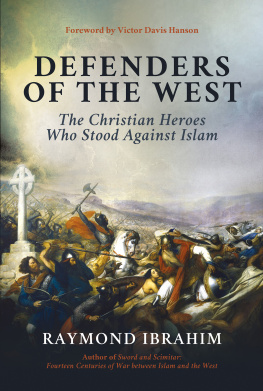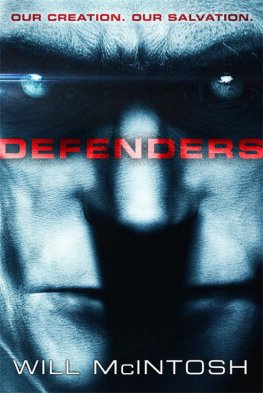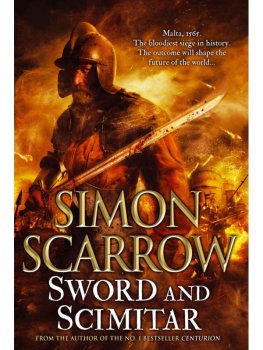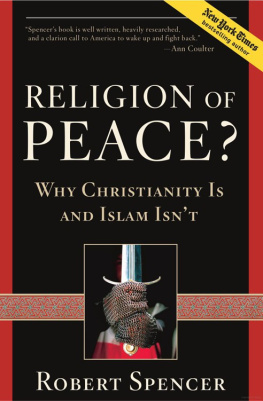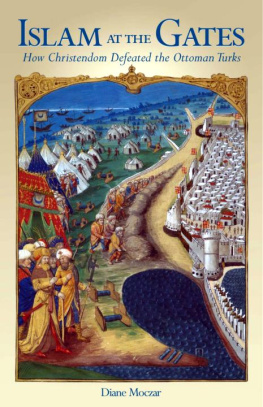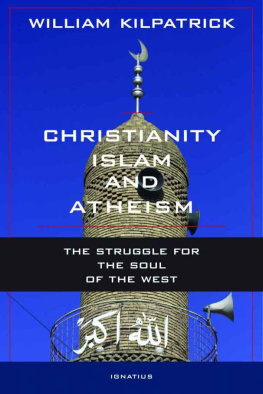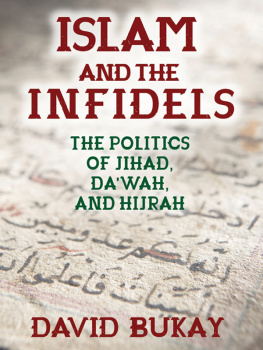Advance Praise for Defenders of the West
Defenders of the West is engaging storytelling of fascinating people and forgotten events at its best. Although anchored in arcane or archaic texts, it reads and flows like an adroitly crafted novel, buttressed by a scholarship that allows those of the past to speak for the past.
Victor Davis Hanson , Martin and Illie Anderson Senior Fellow, Hoover Institution
Relying primarily on contemporary sources, Raymond Ibrahim vividly tells the story of eight eminently violent men who played leading roles fighting Muslims back in the era 11001500, when Christianity was a muscular religion. By recalling those exploits, the author hopes not just to pay tribute to distant accomplishments but to inspire todays Christians again to stand against Islam.
Daniel Pipes , president, Middle East Forum
For two decades, Raymond Ibrahim has been one of the few historians telling us the truth about Islam and its thousand-year assault on the West. With narrative force, clarity, and a command of primary sources, his new book Defenders of the West tells the story of that millennium of aggression and the heroic resistance that saved the West from its oldest enemy.
Bruce S. Thornton , Research Fellow at Stanfords Hoover Institution, and Executive Member of the Working Group on the Role of Military History in Contemporary Conflict
Military historian Raymond Ibrahim is of Egyptian origin, fluent in Arabic, and an expert on the centuries-long armed conflicts between the West and Islam.
National Association of Scholars
In a brilliantly written and highly dramatic book, Raymond Ibrahim brings to life eight Christian heroes who stood up against evil and injustice to fight for human dignity and the Christian faith in various theatres of war. Remarkable tales from a time of massive upheavalnot unlike our own age. While the book outwardly documents a history of fierce warfare, it also manages to invoke matters of the heart that are relatable to the average reader.
Hanne Nabintu Herland , African-born historian of religions and bestselling author in Norway
Raymond Ibrahim is a highly intelligent student of history and the civilizational warfare of Islamic jihadism.
Allen West , retired U.S. Army lieutenant colonel and former Member of the U.S. House of Representatives
With his trademark erudition and intellectual courage, Raymond Ibrahim chronicles the exploits of eight Western Christian Defenders against Islamic imperialism, including fourFerdinand, Hunyadi, Skanderbeg, and Vlad epewho defended or liberated their home territories from Islam. An unapologetic, pellucid reminder for our era about the necessity of standing resolute against the unprovoked aggression of Islams timeless institution, jihad.
Andrew Bostom , MD, MS, author of The Legacy of Jihad , The Legacy of Islamic Antisemitism , and Sharia Versus Freedom
This exciting and very well-researched book introduces us to the lives and heroic deeds of courageous men who, against great odds, defended their people and their culture from an implacable enemy.
Daro Fernndez-Morera , Associate Professor Emeritus of Northwestern University, author of The Myth of the Andalusian Paradise: Muslims, Christians, and Jews Under Islamic Rule in Medieval Spain

Published by Bombardier Books
An Imprint of Post Hill Press
Defenders of the West:
The Christian Heroes Who Stood Against Islam
2022 by Raymond Ibrahim
All Rights Reserved
ISBN: 978-1-64293-820-3
ISBN (eBook): 978-1-64293-821-0
Cover Design by Tiffani Shea
No part of this book may be reproduced, stored in a retrieval system, or transmitted by any means without the written permission of the author and publisher.


Post Hill Press
New York Nashville
posthillpress.com
Published in the United States of America
Contents
To all the Past, Present, and Future Defenders of that which is Good, Right, and True.
by Victor Davis Hanson
R aymond Ibrahim is well known for translating and editing the mostly unknown writings and communiques of Osama bin Laden and Dr. Ayman al-Zawahiri in The Al Qaeda Reader (2007). In the post-9/11 climate, Ibrahim revealed to Western readers the sharp dichotomy between the terrorists filtered Islamism that appeared in English, and the fiery jihadism they spoke and composed in Arabic to inflame their own constituencies.
In the following years Ibrahim focused on yet another little known but increasingly worsening tragedythe systematic oppression of Christian minorities throughout the Islamic world, culminating with his book, Crucified Again: Exposing Islams New War on Christians (2013).
With Sword and Scimitar: Fourteen Centuries of War between Islam and the West (2018), Ibrahim offered an analysis on how and why for nearly a millennium-and-a-half, the Islamic world and the West fought so violently and seemingly endlesslyand why outmanned Western militaries in often far-off, hostile theaters were able to persevere due to superior technology, logistics, and organization. In so doing, Ibrahim was returning to the same academic focus he had over a quarter of a century earlier as a university student, when he and I first met in the mid-1990s and I eventually became his MA thesis advisor on the first major military encounter between the Christian West and Islamic East, the Battle of Yarmuk.
Now in Defenders of the West , Ibrahim revisits these historical themes of West-East adversity. But he focuses on individualsspecifically eight important Christian warriors who fought Islamic armies in various iterations of nearly endless conflict.
Some are familiar names, known from Hollywood epics (El Cid and Richard the Lionheart). A few survive in sensationalized form in popular culture (Vlad the Impaler, now more popularly Dracula). Others may be vaguely recognized by eponymous place names in America and Europe (St. Louis and San Fernando). And yet the most impressive are now mostly unknown to contemporary readers (Godfrey of Bouillon, John Hunyadi, and Skanderbeg).
Even so, for centuries, all were canonized in the West for their largely successful roles in beating back Islamic invasions of Europe or reversing Islamic occupations of lands of the former Roman Empire, in the Iberian Peninsula, the Balkans, and the Holy Land. Such Western-centric characterizations may seem controversial today, given both the postmodern mood of Western society, the later nineteenth/twentieth century European colonial and imperial occupational presence in the Mideast and North Africa, and, more recently, the successful propaganda of radical Islamists, ranging from Osama bin Laden to Recep Tayyip Erdoan, concerning how the West today illegitimately occupies or controls land still belonging to various caliphates and sultanates of the past.
Ibrahims biographical theme is that all these quite diverse European leaders saw themselves as defenders not just of religion alone, but of a civilization antithetical to those of their enemies. In what now may seem an archaic sensibility, they were fighting for a unique way of lifeor often a restoration of itagainst a rising challenge completely foreign to everything in their experience, from the aspirations voiced on the Sermon of the Mount to Classical traditions of individual liberty.
In this and past books, Ibrahim sees the strife between the Westformerly though now anachronistically called Christendom, given its widespread agnosticism and atheismand Islam as unending. The tenets of these two religions, he posits, have for centuries been seen as incompatible, given that Western pacifism has no counterpart in the Koran and the Hadith. Yet the postmodern attractions of globalism and materialism, combined with Western-style consensual government and free-market capitalism, make it ever more difficult to convince affluent and leisured Western publics that many leaders in the Islamic world have never dropped its ancient ideas of jihad. Few now comprehend that many in the Muslim world want no part of a Westernized end-of-history or ecumenical vision of global harmonization. And those that do partake in Western consumer capitalism often blame the purveyors, not the consumers, of such addictive materialism.
Next page
